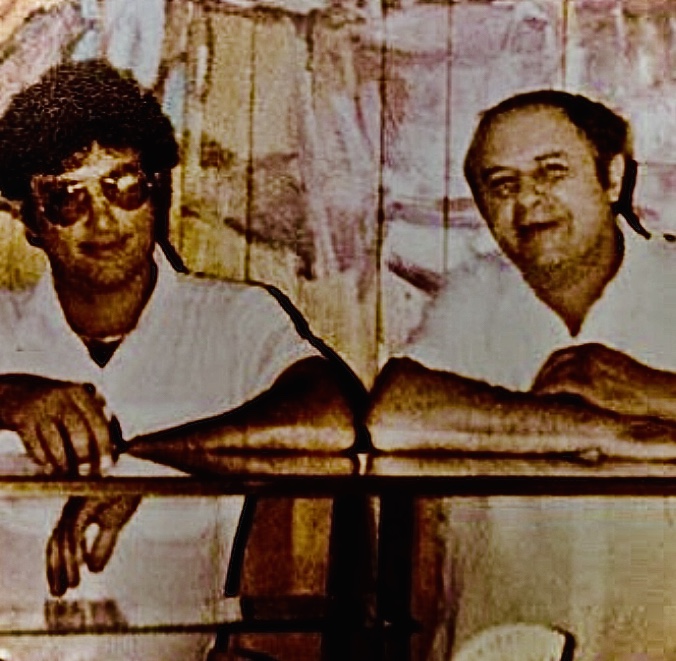
One day a few years ago, Ernie called his son Morde, who works as a self-employed limousine driver in the Bay Area.
The brief discussion said much about their rough-edged relationship.
How maddening it was to have Ernie for a father.
“Why don’t you come up to Lake Tahoe?” Ernie asked. “It’s your birthday.”
“Yeah, it’s my birthday,” Morde responded. “Why don’t you come down here? You always come down to play poker with your friends. Come see your son.”
“I have a few hundred dollars for you.”
“I don’t need your money. If you won’t come down, put it into my account.”
“Oh, forget it,” Ernie said. “I don’t have time.”
And he hung up.
Morde understands his father. He isn’t rattled by Ernie’s brusque exterior.
“I don’t listen,” he says. “When he screams, it goes in one ear and out the other.”
Once, Morde recalls, Ernie was eating burgers at a restaurant with one of his Morde’s daughters, who was trying to explain a story to her grandfather.
Ernie turned to her.
“Listen,” he said. “When I’m eating, you’re dead.”
Morde laughs at the episode.
“People get all upset and offended at the things he says, but that’s just him.”
Morde is sarcastic as well.
He’s his father’s son, after all.
He’d tell Ernie on the phone: “Can’t you hear me? Get a hearing aid.”
Or “Stop mumbling. You need a new set of teeth.”
And Ernie would laugh.
For a moment, defanged.
Morde understood his father. He knows he was a self-made businessman who worked long hours to carve out his own success. He knows how just one slip up in the kitchen can cost time and money.
Ernie taught him: Do your job. If you can’t, step aside. Don’t waste his time.
And Morde has always respected that.
Sure, Ernie yells, he says, but he’s never profane.
“And once you were out of his kitchen” Morde recalled, “everything was cool.”
For years, Ernie ran the Bay Area’s only kosher bakery. People came for his strudel.
Every Rosh Hashanah, his challah was in high demand. Customers needed him; not the other way around.
And he knew that.
But here’s where the perfectionist part comes in, the character flaw that drove people from Ernie in droves.
“In the beginning, Ernie did the baking, the marketing, the financial stuff. He bought all the raw materials for his products,” Morde said.
“There was a lot of pressure. He did everything. He worked six days a week. He couldn’t delegate to anyone. He didn’t trust them. He thought he was the only one who could do things the right way.”
Once, Ernie’s cashier took a day off. Ernie noticed the replacement girl clumsily putting a customer’s order into a small box, one pastry on top of the other.
He’d spent hours making his creations. Unlike the competition, which used machines to work their dough, Ernie did things the old fashioned way.
He stood at a table, 5-feet-by-2-feet, covered with a cloth. He set the oil-covered dough out the night before and then used his hands and muscle to stretch it out, firmly but cautiously, so there were no holes.
Then he’d roll the dough and bake the results, covering the finished product with powdered sugar.
That day, Ernie knew the pastries would be crushed in the small box and called for a bigger one. He stepped up to scold the worker.
The female customer stopped him.
It was fine, she insisted.
Not for Ernie it wasn’t.
“No,” he said, “they have to be packed the right way.”
“Leave her alone,” the woman said. “She’s doing it right.”
Well, you can guess what happened.
Ernie told the woman to get out of his store. He didn’t need her business. These were his pastries; he knew how to handle them.
Morde says it’s been this way from the beginning. He’d seen how Ernie treated his second wife Shoshana in the kitchen.
“Nobody wanted to work there. It was like working alongside some crazy whirling dervish,” Morde recalled. ‘If she screwed up, even in the slightest way, there would be hell to pay.”
Once. Morde said, his father yelled at Shoshana for 20 minutes.
“When he was done, he yelled for another ten minutes, saying she’d wasted his time by invoking the first tirade.”
As a boy, Morde was scared to even visit his father at work.
“I don’t want to hear all the yelling,” he’d tell his mother.
“Go, go,” Helen would say. “It’s OK.”
It wasn’t until he became a teenager that Morde tried sarcasm with his father.
It worked.
When Ernie asked him to taste a new creation, he’d say, “It tastes like shit.”
“Good,” Ernie would fire back. “This one’s going to be a good seller.”
His father might have yelled and threw tantrums, Morde says, but he was also quick to stand up for his son.
Morde struggled in the first grade and teachers wanted to hold him back.
But Ernie would have none of it.
“He came to class every day and sat right behind me – like Gulliver among the Lilliputians. I had a gorilla behind me. Man, he was tough.”
Despite Ernie’s deep flaws, Morde still cared about his father.
“It’s like having a little brother who you love and care for, but you really just can’t stand.”
Still, he knows he paid a high price for having a kitchen tyrant for a father.
“The thing I missed the most is that I never had a Dad to go do things with,” he said.
“Mine was always working too hard.”





















 More news and opinions than at a Shabbat dinner, right in your inbox.
More news and opinions than at a Shabbat dinner, right in your inbox.